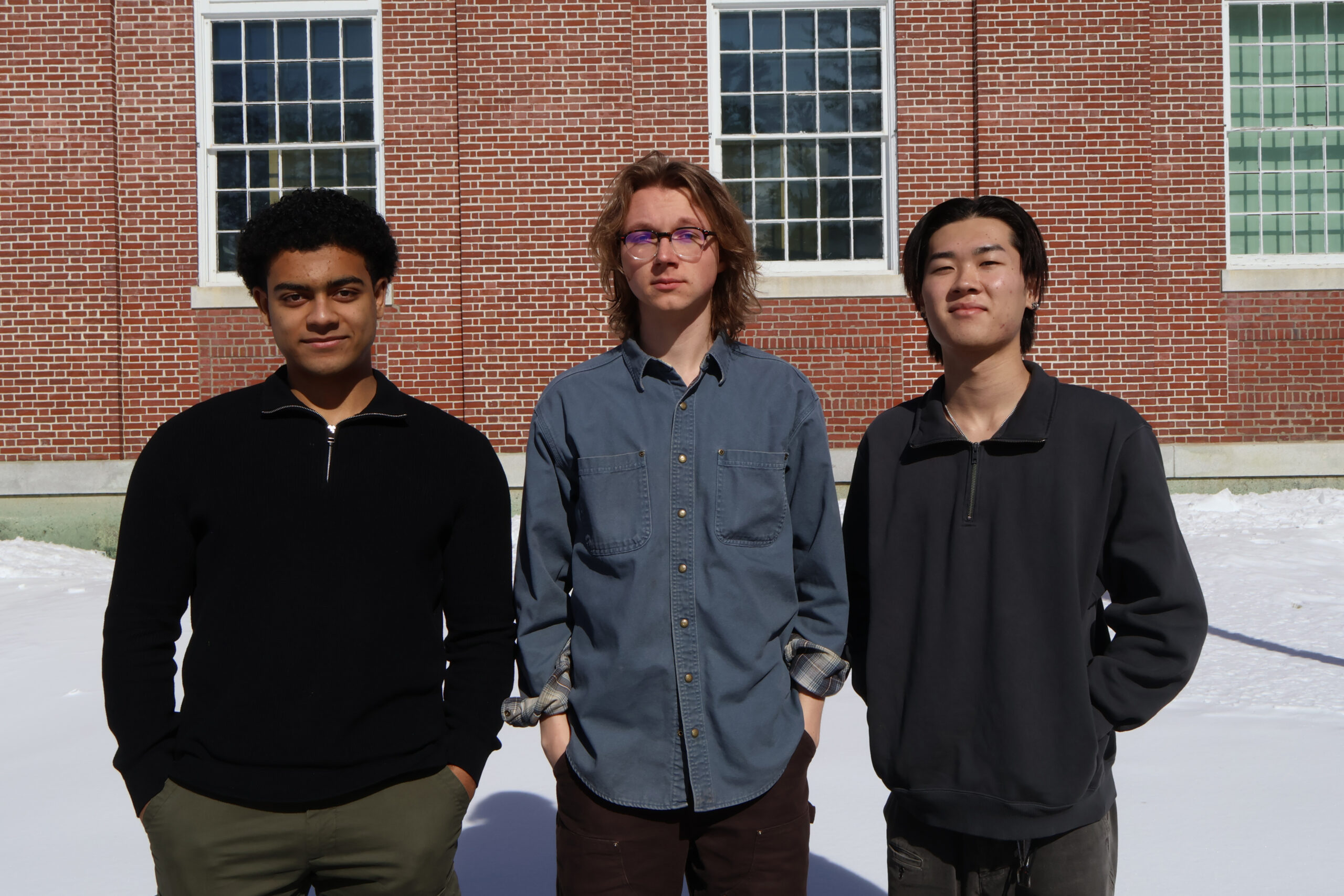Students develop AI tool to improve writing skills at hackathon, highlighting AI’s potential in academics
February 21, 2025
 Abigail Hebert
Abigail HebertThree Bowdoin students participating in a hackathon earlier this month developed an educational tool to improve writing skills using artificial intelligence (AI), raising important questions about the role of AI in relation to academics.
Hackathons, events where teams collaborate over a limited amount of time to program a project, are held across the world of computer science. On February 1 and 2, Niklas Chaney ’28, Aoi Araki ’28 and Karim ElSedfy ’28 participated in Hack@Brown, held at Brown University in Providence, R.I. In a 24-hour time period, they created WriteUp, an AI-powered tool that uses a game-like approach to build writing skills.
This year, Hack@Brown had 217 participants who submitted 68 total projects. The Bowdoin team, all of whom were participating in their first hackathon, competed in the Generative AI category. Though they did not win any prizes, Chaney still views it as a positive experience, emphasizing how it was different from solo programming work he had done before.
“I’ve done a lot of projects just on my own, but it’s a very different experience,” Chaney said. “I think working in that group setting lends a level of accountability … [because] your team is relying on you. Everyone is expecting you to work together to create something.”
WriteUp gives various prompts to users, whose responses are then scored and reviewed by AI. The user is able to level up to different rankings depending on their scores.
As college students, Chaney and his team wanted to address the role of AI in academics, a space currently filled by models such as ChatGPT.
“If I were to just write an essay and throw it into ChatGPT, it would just be like, ‘Good job. Bad job. Rewrite this section.’ And it’ll probably do it for you, which isn’t the best way to learn writing,” Chaney said. “So we thought it would be much more helpful if you actually had a peer review to highlight sections and give specific feedback.”
In addition to the benefit of more specialized feedback, Chaney said a program like WriteUp could lessen the risks of AI in academic contexts, as it still ensures the student is putting in work.
“There’s a lot of talk around the risks of AI in academics, like in coming up with random hallucinated sources or students using it to just write essays for them, and our goal is very much to utilize the strengths of [AI] in a way that would mitigate those risks and make it still give the benefits to students,” Chaney said.
Chaney believes that models like WriteUp could help make writing education available to communities who need it, such as the international student population in which Araki and ElSedfy are included.
“The way that they teach writing in the U.S. is not necessarily the same as they would teach it internationally. And there are also underserved communities where you may not have access to the same level of writing education as you would in other places. Our goal with this [project] was to give access to those communities to learn specific writing skills and get that very important direct feedback to your writing in a low-cost, accessible manner,” Chaney said.
Visiting Lecturer in Computer Science Christopher Martin views Chaney, Araki and ElSedfy’s project as impressive, especially given the limited time of the competition and that they were all first years attending their first hackathon. He also says WriteUp is highlighting positive uses for AI, which is especially relevant given increased discussion surrounding the topic at the College.
“AI and content generation may be scary,” Martin said. “But we can use these tools for positive purposes that are not infringing on people’s copyright or taking the human out of content generation.”
Martin agreed with Chaney that the positives of WriteUp stemmed from its learning-based approach.
“[The AI is] more there as a guide, to potentially point you in the right direction,” Martin said. “It’s actively trying to have you, the person, get better at the thing that you’re trying to do. And that’s definitely what sets [WriteUp] apart.”
While the three first years are currently busy with academics, Chaney says they might move forward with WriteUp in the future.
“We haven’t had a ton of time to work on it, but we do have ideas and plans that we think we could implement, and it could blossom into something more,” Chaney said.
A central lesson for Chaney has been the potential of AI for positive informational and academic uses.
“The goal is to make information and skills more accessible and easier for you to learn…. In my opinion, I think AI should be used more as a learning tool and a resource, rather than, ‘I’m gonna get AI to write an email,’ or something,” Chaney said. “I think that is the direction that we should go.”

Comments
Before submitting a comment, please review our comment policy. Some key points from the policy: